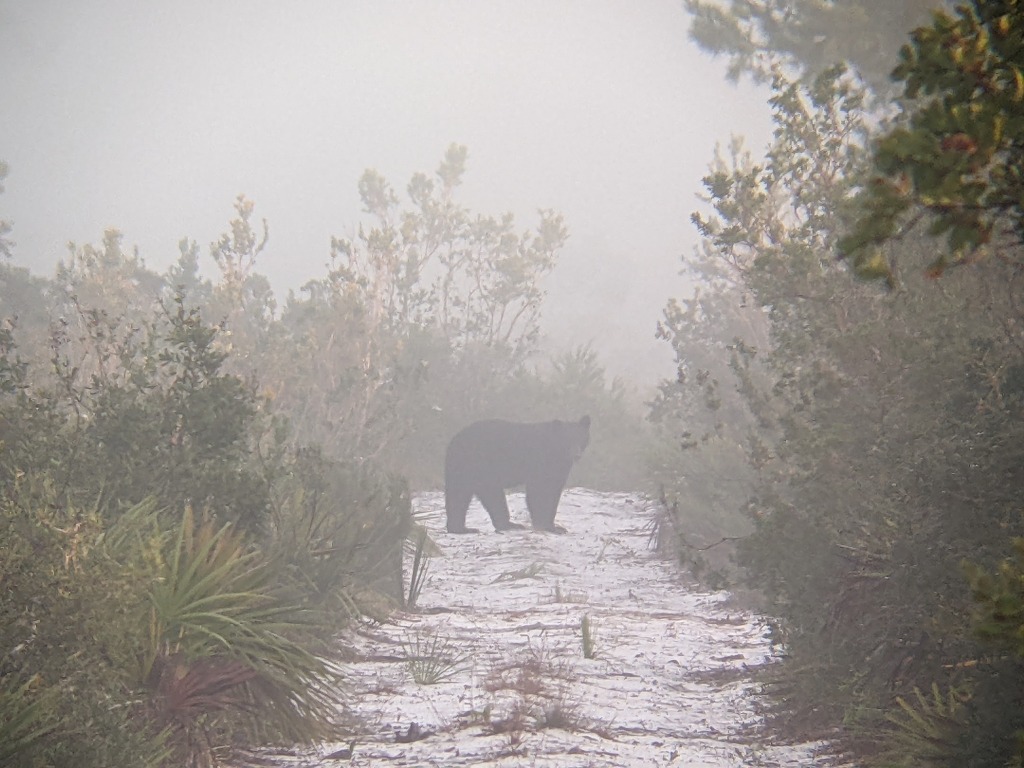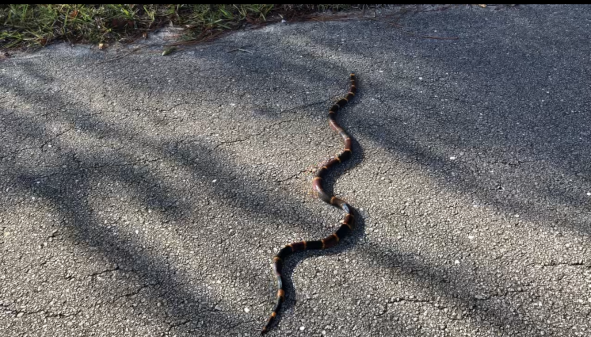
If you wander around any of the many wonderful wild places in Florida this time of year, you may be surprised to see so much wildlife wandering around. Just as humans enjoy the mild temperatures in Florida during the winter months, wildlife also takes advantage of the warmer climate. As many animals in cooler climates reduce their activity, or even hibernate, when the temperature drops, wildlife in Florida continues to be active throughout winter.
Black Bears in northern populations are not active this time of year, denning for several months while it is cold, and food is not available. However, male and non-pregnant female Florida Black Bears may only den for a few weeks when temperatures become too cold. Food is typically available year-round here due to Florida’s mild winters and Florida Black Bears wander around during winter months in search of their next snack. Joe Guthrie, Archbold’s Predator Prey Program Director, explained, “bears this time of year are showing a behavior known as ‘hyperphagia’, which is the extreme unsatisfied drive to consume food.” Florida is home to a wide range of excellent bear food, including acorns, Scrub Hickory nuts, and Saw Palmetto berries. Most of this increased activity is during daylight hours, from dawn up to late morning, with another peak from mid-afternoon to dusk. This increase in activity also increases the chances of humans encountering a bear while exploring Florida’s wild places. If you are out wandering in a wild place, be mindful of signs of bears, including tracks and large piles of fresh bear scat.
Reptiles and amphibians are also quite active in Florida during the winter months. Reptiles and amphibians are considered ‘cold blooded’ because they can’t regulate their body temperature internally, so they move to warm, sunny, spots when it is cooler. Snakes are often seen basking on paved roads to warm themselves after a chilly morning. Some snake species are venomous, and others may bite when they feel threatened. As such, Archbold does not advise picking up snakes; instead, if you see a snake on the road while driving, simply brake and give the snake time and space to finish crossing the road. Similarly, you may see alligators crossing roads, particularly during the dry season as they seek out new water sources or males seeking mates in the mating season. Never approach an alligator, rather give it room to cross the road by itself.

Tortoises and turtles are also frequently seen wandering along or crossing roads. If you see a turtle or tortoise one on a road while driving and can safely stop, pick it up with two hands on either side of the shell, towards the back, and place it well off the road in the direction it was headed. Never lift a turtle by the tail or a leg and be sure to sanitize your hands after touching any wild animal. While tortoises and most of the turtles you will encounter are gentle, be extra careful around softshell and snapping turtles, as they may bite if they feel threatened. If in doubt, simply remain in your vehicle and give the turtle space to cross on its own.
If you come across a living animal that has been struck by a car, you can contact your local wildlife rehabilitation center. Archbold Biological Station is not a wildlife rehabilitation center and does not have the staff, facilities, or permits to care for injured animals. Instead, you should call a licensed wildlife rehabilitator such as the Audubon Center for Birds of Prey or visit the Florida Fish and Wildlife Conservation Commission website to find a contact. If you cannot reach a licensed wildlife rehabilitator who can treat the type of animal you found, you can contact FWC’s Southwest Regional Office for assistance at (863) 648-3200.
Archbold is home to a wide range of wonderful wildlife during the winter months and will be re-opening to the public in January. Please check our website or Facebook page in the new year for updates on open hours to see when you can come to wander around the Archbold nature trail and view the wonderful wildlife.
